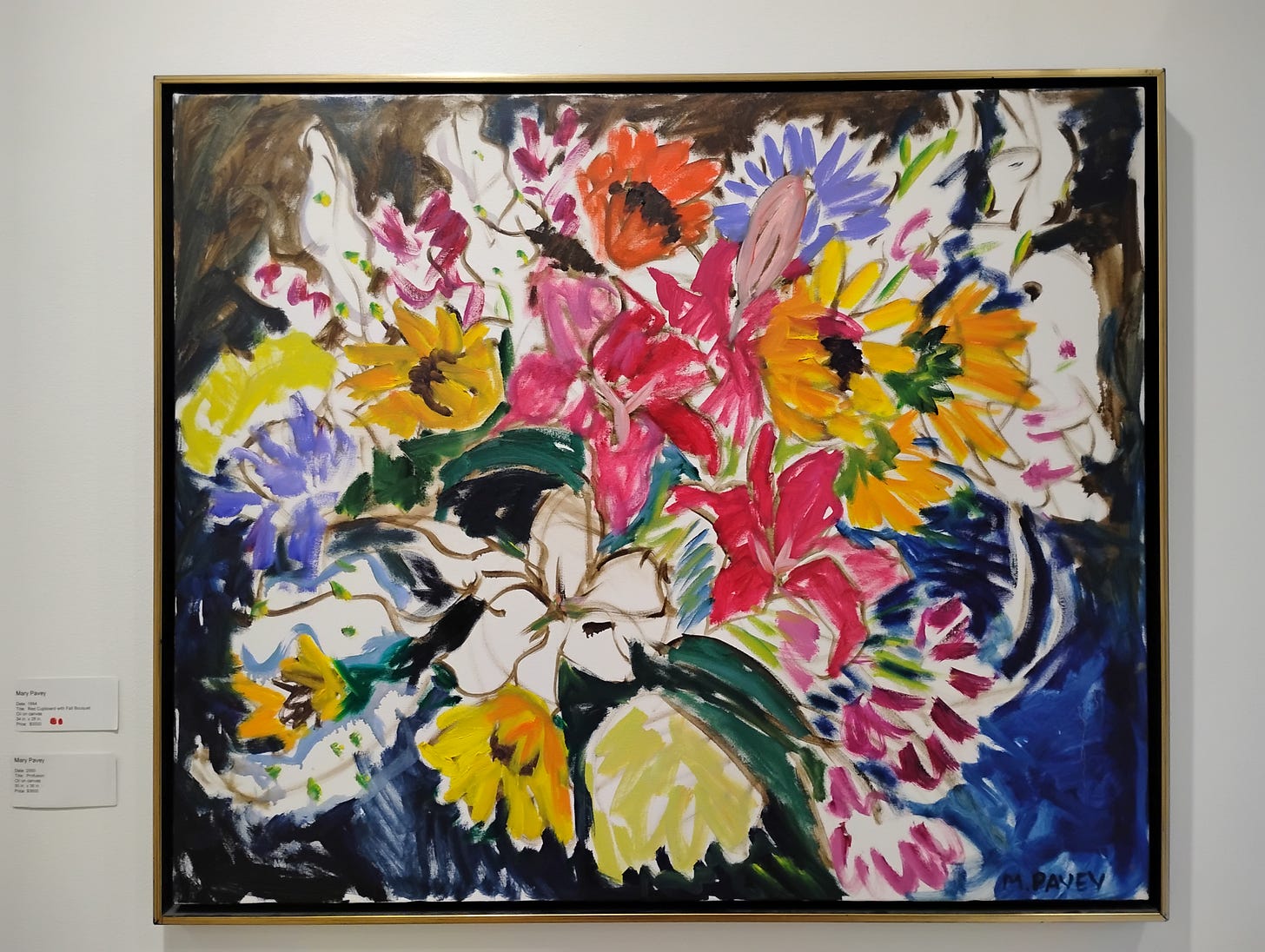Caught in the rain in Wychwood Park
Rain, art, cancelling again, podcasting again: next-to-last Notebook of 2024
Out on a walk in the Bathurst-St Clair area the other day, I got caught in the rain at dusk time in Wychwood Park. I’d forgotten what an unusual place WP is. The naked branches situation opened up the view into living rooms, though a lot of houses remained dark or with the light on in one room only. Next to the most exclusive public tennis court in town, a Little Free Library.
Marshall McLuhan I think lived around here, but I couldn’t think of anyone else, except for Muriella Pent from Russell Smith’s eponymous novel (in which this gated comm was given a slightly different name). Few people out, all of us just passing through, some carrying shopping bags using WP as a shortcut between shops and home, a dog walker or two.
I escaped from the grey into the James Rottman Fine Art on St. Clair West. Meet Mary Pavey, a Toronto-based painter (b. 1938):
Broken Pencil now officially broken
When I talked to Hal Niedzviecki a year ago about his brush with cancel culture, I almost asked him, but didn’t, Wait, the activists have been leaving Broken Pencil alone?
This was a truce rather than a lasting peace, it turns out. Few of us outside those alt mag circles noticed pro-Palestinian activists placing various demands before Hal and the magazine since October 7 and during the subsequent war in the region. So it came as a surprise when Hal announced that he was closing the magazine down because his job was becoming impossible due to activist demands and the online hassling of contributors. This Open Letter (another one of those, yes) probably has a lot to do with it. According to its authors, Hal’s main sin is being pro-Israel in some of his Tweets and refusing to publish any statements about the Israel/Hamas/Gaza/Iran war in a magazine about alternative pop music and comics.
This caught my eye:
In essence: say what we ask you to say, publish who we instruct you to publish, oh and also resign, and maybe then, only maybe, we’ll leave your magazine alone.
How do people come up with these mad maximalist demands? (Some of the Giller activists were equally ambitious.) I’m sure they will all now start their own alternative magazine, and make it as Palestinian as they deem necessary. /s
Canadaland podcast lab
I went to the half-day podcast conference held in the Canadaland offices as a tourist from another culture (writing, and diversity of opinion). I was primarily interested in how Canadian podcasters monetize their work and earn a living in such a small market. This was only touched upon in passing a couple of times, but my main takeaway is create content for American markets and hire Americans?
That there exist podcast production companies in Canada with a dozen salaried staff was a pleasant surprise but then I figured their podcasts must be almost all for US markets. (I overheard one of the young executives directing someone to her car afterwards and saying “it’s a Tesla”, and my first thought was, No thanks to your Canadian downloads.) A CBC podcast person was on one of the panels… apparently the Front Burner, the CBC flagship news podcast, I’m quoting here, no chance of checking, is being downloaded more than a million times a month. When someone in the audience asked her about Tested, the podcast that they produced during the Olympics on the topic of DSD athletes in women’s sports, I looked for it online and discovered that it was made by a US podcaster, a they/them woman based in the Bay area whose pet project was the history of sex testing in sports. (“We didn’t really need the NPR for this, we could have had the same success on your own” the CBC person said at one point so I expect this podcast was done for the CBC, not as an NPR-CBC co-pro.) The podcast itself is a blinkered take on XY chromosomed people with disorders/difference of sexual development (ie males) and their great success in female sporting categories and how the meanies who don’t like strong women are out to get them and make their lives miserable. Complete journalistic malpractice, but I’ve come to expect nothing else from the CBC on the issues around gender and sex.
So I realized that the podcast producing is an easy loophole through which the national broadcaster contracts out production jobs to foreign citizens.
Canadaland itself is no stranger to hiring outside-Canada hosts and researchers, though being a privately owned company and not the national broadcaster they are certainly within their moral rights to do so. Still, there was no one in Canada who could do an LGB series for Canadaland? Field Guide to Gay Animals is made by a US crew, based in the US. Could they not place it anywhere else in the great vastness of the US media land? Apparently not.
Lots of other useful info at the conference. Canadian podcast listener still skews educated and high earning. Canadaland ad person literally makes cold calls to companies to pitch ad opportunities and partnerships. First major ad in the early days of the podcast was Fresh Books, and they invested because they liked the company, not because it had high (or anywhere near sufficiently high) traffic numbers. Acast and similar companies will get you on their network and supply ads themselves and split revenue if they take you on - but you have to have surpassed a certain level of downloads a month to get on their network. Other ways of earning ad revenue remain mystifying to me (counted in units of something-per-mill). Canada’s podcast industry never had a (VC-fuelled?) growth period which the US had. There is probably no such thing as Canada’s podcasting industry (said by Jesse Brown, and he’s probably right).
I was one of the earliest Canadaland listeners and still remember its very first episode (Jesse Brown interviewing Michael Enright). I stopped listening to Canadaland not long after the Ghomeshi scandal, at the time of its steep rise when it decided to abandon pluralism, identified its core audience, took sides on major issues and pushed on those with abandon. On the issue of pediatric transition, Brown and some of the other staff publicly took the line that people questioning medical and social transition of children do harm, and not those transitioning them. They took a hard line on “cultural appropriation” and indigenous issues. They took a hard line on MeToo; I remember Brown being unhappy about Robyn Doolittle’s book in which she expressed her support for due process. Was all this good for the business? Apparently. The small, more pluralistic Canadaland actually had a neutral segment on Meghan Murphy, when Rabble dot ca closed down her column because of wrongthink. The big, less opinion diverse Canadaland post-Ghomeshi would not have touched with a CN Tower-long pole anything related to Meghan Murphy.
Brown introduced some element of pluralism on the topic of Israel and the Middle East recently and lost a chunk of subscribers. Some of us thought he would see the light and introduce diversity of opinion and angles of reporting on some other topics too. So far, this is not happening. The Middle East remains one issue where Canadaland goes against the grain of its own audience (capture).
This said, one thing is undeniable: in a weak to nonexistent Canadian podcasting market, Brown created a sustainable media business out of nothing, with no government support (sure, the capital from the sale of his tech startup probably helped). There are jobs now where there were none, and they are unionized jobs too. On the less positive side, there’s been a significant staff turnover in journalistic and permalancer positions and I can see little evidence of long-term loyalty and commitment, and a stable media company that’s not a one man show needs it. Brown’s role has been fluctuating over the years from publisher owner to editor to publisher to editor, and maybe this is something that needs delineating more neatly, or giving it an official merge.
Many many years ago and a thousand producers ago I pitched a (turns out, unpaid) producer of Canadaland on some art topic or other, and she made some positive noises about it, but the company could pay for labour intensive shows a nominal fee only (it was something like $200 per episode back when I was being paid $500 per piece of writing in a music magazine). I might have stuck it out had the producer herself not quit soon after, and I acquired the impression of a company living with a degree of permanent chaos. Soon after I stopped listening too, for reasons mentioned above.
I would like it to succeed and grow, in all honesty. But I wonder if the new online outlets that took a package-bundle of opinions as their editorial policy over the last decade, and built their audience on this easily identifiable orthodoxy, are going to survive long-term. Some people argue that those will be the only outlets that will survive in the new, post trad journalism eco-system. I still want to believe that news consumers won’t opt for a monoculture deferential to their priors, but from where we’re sitting right now, it’s hard to tell.











The media commentary is especially valuable, thanks.